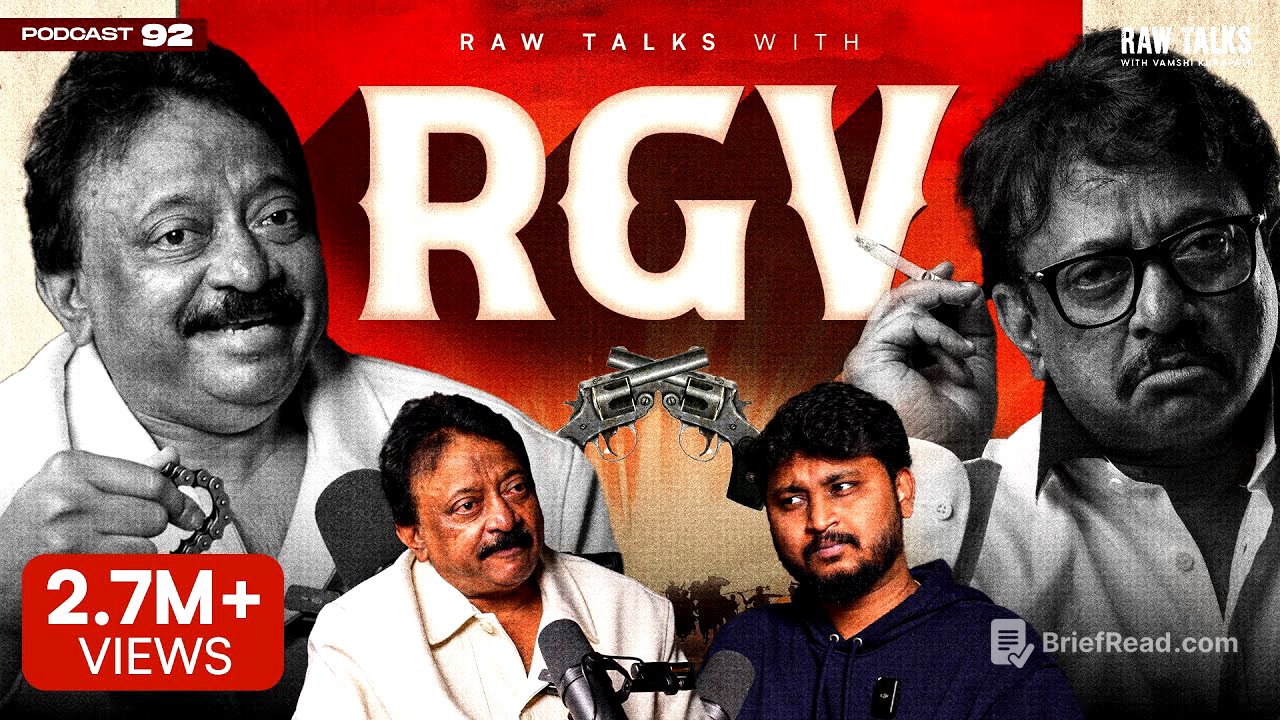TLDR;
This YouTube video features an in-depth conversation with RGV (Ram Gopal Varma) where he shares his perspectives on various aspects of filmmaking, crime genres, censorship, movie reviews, ticket pricing, and his personal influences. He also touches upon his experiences, regrets, and thoughts on money, parenting, and the evolving landscape of content consumption.
- RGV discusses his comeback in the film industry with "Syndicate," a futuristic crime organization concept.
- He shares his views on the outdated censorship system in India and the importance of logical updates.
- RGV talks about the role of movie critics and their impact on the film industry.
- He explains his approach to writing a story and his experiences with AI, particularly Grok.
- RGV provides advice to upcoming filmmakers and shares his thoughts on the future of Indian cinema.
Introduction [0:00]
The host introduces RGV and mentions a rumor about him meeting Ibrahim. RGV acknowledges the rumor and jokes about hiding his butt, setting a casual and humorous tone for the discussion.
The comeback [2:24]
RGV discusses his upcoming movie "Syndicate," explaining that it explores a futuristic crime organization. He contrasts it with traditional underworld stories, noting that real criminal organizations have evolved into terror groups like ISIS. RGV emphasizes that "Syndicate" is a realistic, near-future concept, not science fiction.
Dawood Ibrahim [5:05]
RGV confirms that he spoke to Dawood Ibrahim on the phone about 15 years ago through a mutual acquaintance. He clarifies that the conversation was formal and related to research for a biopic or gangster film. RGV recalls asking a gangster about his feelings on killing, revealing the gangster's shocking response that he felt happy because he killed for a reason.
Why does the audience enjoy watching genres like crime, thriller etc? [7:53]
RGV explains that people are drawn to crime and thriller genres because they offer an escape from routine life and provide a vicarious experience of the extreme. He believes that humans are inherently drawn to negative aspects and unusual events, as they provide excitement and allow the "wild animal" within to come out.
Censorboard in India?! [9:24]
RGV criticizes the Indian censor board as an outdated system based on the 1952 Cinematograph Act. He argues that in the age of digital media and global access to content, censorship is pointless and treats the audience like children. RGV suggests that the censor board should be updated with logical guidelines, similar to the rating system in America, which informs viewers about the content (sex, violence, drugs) without restricting access.
Movie critics [13:14]
RGV acknowledges that movie critics are an inevitable part of the ecosystem and that everyone judges everything. He compares reviews to rain, suggesting that filmmakers should adapt and not be discouraged by criticism. RGV notes that social media has amplified the impact of reviews, but ultimately, audience reviews are more important.
About Ticket Price [17:35]
RGV discusses the debate around high ticket prices, particularly for premiere shows. He argues that manufacturers (filmmakers) have the right to price their product as they see fit, and it's up to the buyer (audience) to decide if it's worth the cost. RGV emphasizes that fans are willing to pay more to experience something special, and it's a capitalist society where people can choose how to spend their money.
Recent times lo meku nachina oka movie scene [21:06]
RGV shares that he liked several scenes in the movie "Animal," particularly Ranbir Kapoor's performance with the machine gun. He explains that while some may find it heavy, it's exciting and memorable. RGV also reflects on a scene from the old film "Adi Rama," where writers focused on formulaic elements, missing the emotional connection with the audience.
Movie decoding [24:57]
RGV discusses the concept of decoding movies and how directors explain their choices. He emphasizes that perspectives change, and a film can be interpreted differently by different people. RGV explains that he doesn't care about William Goldman's principles. He uses the film "Animal" as an example, noting that some viewers criticized the underwear sequence, while others found it meaningful.
Shiva movie changed the entire metrics? [28:45]
RGV reflects on his film "Shiva" after 35 years, realizing that its uniqueness lay in the hero not talking like a hero but like a normal man. He points out Nagarjuna's portrayal of Shiva as a student who challenges the system and the unconventional music and fight sequences. RGV expresses surprise that no one followed this successful formula, including himself.
Rajnikanth Garu [35:07]
RGV discusses Rajinikanth and the importance of technology in filmmaking. He argues that Rajinikanth's superstar status is partly due to the slow-motion camera, which enhanced his unique style. RGV also mentions Bruce Lee as a fascinating personality and a thinker who influenced him greatly.
Raktacharithra [37:04]
RGV recalls the opening sequence of "Raktacharithra," where Vivek Oberoi comes on a scooter in slow motion, creating a surprising and impactful moment for the audience. He explains that the unexpectedness of the scooter, compared to a fancy bike, contributed to the scene's success. RGV also shares anecdotes about audience reactions to his horror film "Deeyam," where unexpected moments of fear and excitement led to applause in the theater.
We didn't make Satya, Satya made us. [42:09]
RGV reflects on the movie "Satya," emphasizing that it was not made by him but made them. He explains that the success of "Satya" benefited everyone involved, and they could not repeat that success even after 25 or 30 years.
Did you ever regret anything you said to anyone? [42:56]
RGV states that he never regrets anything he said to anyone because he was being himself. He explains that if he goes wrong, he will take his next decision, but he doesn't go back to what he already is.
Reddit [43:57]
RGV addresses a Reddit thread where someone criticized him for generalizing about women in an interview. He explains that his response depends on each individual's perception of what is offensive. RGV also clarifies that he has never received any serious threats, dismissing claims of attacks on his house as publicity stunts.
What Is Money To You? [45:39]
RGV shares his perspective on money, stating that it's about what you do with it and not just how much you have. He emphasizes that money is potential energy and only becomes valuable when it's used. RGV also mentions that he doesn't know how much he earns in a year because it works on rotation.
How to say no? [47:38]
RGV shares advice on how to say no, quoting Father Michael Karliana's father, who said that the best way to say no is to do it. He provides examples of how stars and directors avoid saying no directly, such as praising the project but citing scheduling conflicts or expressing a lack of excitement.
About Parents [50:47]
RGV discusses the pressure youngsters face from their families to pursue certain careers. He advises that while parents may be loving, they may not always be smart, and it's important to have the conviction to make your own choices. RGV shares that his father supported him in doing whatever he felt like, which he is grateful for.
Bounded script [52:11]
RGV explains that he doesn't go with a preconceived script, as it was too much in his beginning. He believes that emotional involvement is more important and that bound scripts can remove that. RGV also shares that he recently watched a video on himself, where he mentioned that assistant directors are not necessary now.
Aspirants still work as assistant directors or join film schools? [53:21]
RGV advises aspiring filmmakers to watch films to learn filmmaking. He criticizes film schools as a big sham, teaching outdated classics instead of relevant movies like "Animal." RGV suggests that youth should make short films with their phones to test themselves and learn from their experiences.
About killing Veerappan [57:27]
RGV discusses his movie "Killing Veerappan," emphasizing the technical aspects and the experience it provides for the audience. He explains that technicality is the whole purpose of creating emotion in a film. RGV shares examples of how he used specific shots and techniques to create fear and excitement in his movies, such as "Shiva" and "Bhoot."
The article - "Indian filmmakers treat audiences as ‘dumb’?"" [1:02:19]
RGV addresses the headline that Indian filmmakers treat audiences as dumb. He explains that filmmakers aim to excite and entertain the audience, but insecurity can lead to making bad films. RGV believes that filmmakers should not try to cater to the dumbest audience but should push the audience and trust their intelligence.
What other movies will come up in the next 10 years? [1:05:07]
RGV shares his thoughts on the future of Indian cinema, emphasizing the importance of innovation and breaking the path. He suggests that filmmakers should focus on innovative techniques and ideas, even with a limited budget. RGV uses the film "Buried" as an example of how a director can create a compelling movie with limited resources by focusing on performance and mind state.
Rgv's DEN [1:08:16]
RGV discusses his "den" and the curiosity people have about it. He explains that he likes to surround himself with beautiful women and that he gets bored looking at the same pictures every day. RGV also clarifies that he doesn't give importance to anyone and that no one makes him feel bad.
What is your approach to writing a story? [1:09:41]
RGV shares his approach to writing a story, stating that he prefers being alone and doesn't socialize much. He explains that he doesn't like traveling to places and prefers watching videos because they are shot much better. RGV also mentions that he is having more concussions with Grok.
Grok - Ai [1:11:15]
RGV discusses his experiences with Grok, an AI, considering it the most knowledgeable and intelligent person. He explains that Grok helps him deconstruct his belief system and provides an opportunity to go beyond his limits. RGV also shares a video where someone attributes their career to him, which he appreciates.
Are assistant directors very successful? [1:13:48]
RGV explains that everyone is influenced by someone else, and it's a normal thing for cinema. He attributes a lot of his career to Spielberg and K Balachander. RGV also addresses the question of whether top actors influence his movies, stating that he wants to make a film which one work.
Babu culture in Tollywood movies [1:15:06]
RGV discusses the creative process in filmmaking, emphasizing that it's a series of decisions taken over a long period. He explains that the creative process is not static and that ideas keep changing. RGV also shares an anecdote about Hollywood stars getting paid millions, suggesting that the more money you get, the more brains you have.
What is a movie you watched the most? [1:19:15]
RGV shares that he used to watch "Mechanic Gold" and "Enter the Dragon" multiple times. He also mentions K Vishwanath garu and his ability to say dialogues like a poem. RGV explains that very few directors have a stamp of the watch that reflects their personality.
Advice to upcoming filmmakers [1:22:54]
RGV advises upcoming filmmakers that a good movie can't take advice. He can only say this with a guarantee. It's your choice, it's the right thing to do.
Content consumption pattern right now [1:23:24]
RGV explains that trying to study the audience and changing mindsets is the biggest mistake people can make. He suggests that filmmakers should make what they feel strongly about and not worry about what the audience wants.
What is something that influences you regularly? [1:25:39]
RGV states that nothing influences him regularly except for Grok. He explains that he is a very curious person and wants to know about everything that's happening. RGV also shares that he is excited to wake up every day because he doesn't know what tomorrow holds.









